30 Best Substitutes for Walnut You Should Try

This post may contain affiliate links. That means, when you buy through links on our site, we may earn an affiliate commission. Please, do your own research before buying.
When it comes to cooking and baking, walnuts are a popular ingredient that can add a delicious and nutritious crunch to a variety of dishes. However, whether you have a nut allergy or simply don’t have walnuts on hand, it’s always good to have a few walnut substitute options in mind.
Fortunately, there are plenty of options available that can replace walnuts in your favorite recipes without sacrificing flavor or texture. In this blog post, we’ll explore 30 different walnut substitutes, including nuts, seeds, legumes, and other ingredients, to help you find the perfect alternative for your needs.
What is whole-food, plant-based diet?
So, whether you’re making a salad, baking a cake, or creating a savory dish, you can feel confident that you have plenty of walnut alternatives at your disposal.
You can also use these 30 best walnut substitutes on salad or for baking purpose.
30 Best Walnut Substitutes
I. Nut Substitutes for Walnut
1. Pecans

When it comes to nuts, pecans are one of my personal favorites. They have a rich, buttery flavor that can add a delicious twist to any recipe calling for walnuts. Not to mention, they’re a great source of healthy fats, fiber, and protein. So, if you’re looking for a walnut substitute that can bring a similar taste and texture to your dish, pecans may just be the perfect option.
When using pecans as a substitute for walnuts, there are a few things to keep in mind. First of all, pecans can be a bit sweeter than walnuts, so you may want to adjust the sweetness of your recipe accordingly. They also have a slightly softer texture than walnuts, which can be an advantage if you’re looking for a nut that’s easier to chop or crush.
Pecans can be used in many different recipes, from sweet to savory. They work great in baked goods, like pies, cookies, and breads, as well as in salads, grain dishes, and even as a topping for oatmeal or yogurt. Pecans also pair well with other flavors, like cinnamon, maple, and vanilla.
One of my favorite ways to use pecans is in homemade pecan butter. Simply roast the pecans in the oven until fragrant, then blend them in a food processor until they become creamy and smooth. Add a bit of salt and honey, if desired, for a delicious spread that’s perfect for toast, sandwiches, or as a dip for fruit.
2. Almonds
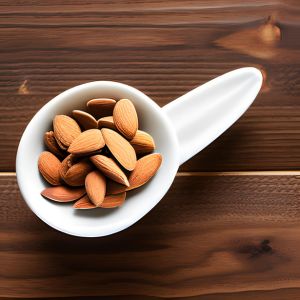
Almonds are one of the most versatile nuts out there. They have a mild, slightly sweet flavor that pairs well with many other ingredients, making them perfect for both sweet and savory dishes. Plus, they’re packed with nutrients like vitamin E, magnesium, and fiber, making them a great addition to any diet.
One of the most popular ways to enjoy almonds is simply roasted and salted as a snack, but they can also be used in a variety of recipes. From almond butter and almond milk to almond-crusted chicken and almond-crusted fish, the possibilities are endless.
Personally, I love adding almonds to my morning oatmeal or yogurt for an extra boost of protein and crunch. I also like using almond flour as a gluten-free alternative in baking recipes.
3. Hazelnuts
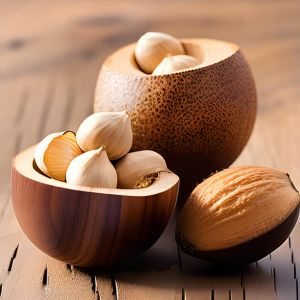
Hazelnuts are a rich and flavorful nut that can be used as a substitute for walnuts in many recipes. They have a slightly sweet, nutty flavor with a buttery richness that can add depth and complexity to dishes. The texture of hazelnuts is crunchy and slightly chewy, which can provide a satisfying crunch in baked goods or salads.
Recommended uses of hazelnuts include as a topping for yogurt or oatmeal, in baking recipes like brownies or cakes, and in savory dishes like roasted vegetables or salads.
4. Cashews

Cashews are a popular nut that can serve as an excellent substitute for walnuts in many recipes. They have a mild, creamy flavor with a slightly sweet undertone that makes them a versatile ingredient in both sweet and savory dishes. The texture of cashews is soft and buttery, which can add a creamy and velvety consistency to dishes.
When using cashews as a walnut substitute, keep in mind that they are milder in flavor than walnuts. So, if you’re looking for a stronger nutty flavor, you may want to add a bit more of the cashews to the recipe. But, if you’re trying to avoid a strong nutty flavor, cashews are an excellent option.
Cashews are also a great choice for dishes that require a creamy or velvety texture, like sauces, soups, and dips. They can be used to make a rich and creamy cashew butter that can be spread on toast or used as a dip for fruits and veggies. Cashews can also be used to add a crunchy texture to salads or stir-fries, by simply chopping or grinding them into smaller pieces.
5. Macadamia Nuts

Macadamia nuts are a delicious and buttery nut that can serve as a great substitute for walnuts in many recipes. They have a rich, sweet, and nutty flavor with a creamy texture that can add a unique taste and texture to dishes.
The texture of macadamia nuts is crunchy and slightly firm, which makes them a great addition to dishes that require a nutty and crunchy texture. They can be used whole or chopped in recipes like salads, stir-fries, or baked goods.
They are much sweeter in flavor than walnuts. So, you may want to adjust the amount of sugar or other sweeteners used in the recipe accordingly. Macadamia nuts are also higher in fat content than walnuts, which can make them a great option for adding richness and creaminess to recipes.
Macadamia nuts can be used in macadamia-crusted fish to sweet treats like macadamia nut cookies or cakes. They can also be used to make a delicious and creamy macadamia nut butter that can be spread on toast or used as a dip.
II. Seed Substitutes for Walnuts
6. Pumpkin Seeds:
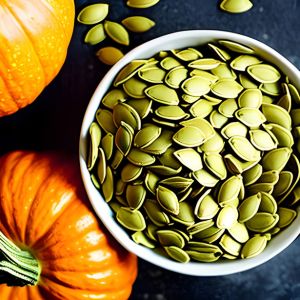
Pumpkin seeds, also known as pepitas, are a great substitute for walnuts. They have a mild, nutty flavor with a slightly sweet and savory taste. The texture of pumpkin seeds is crunchy and slightly chewy, which makes them a great addition to recipes like granola, trail mix, or as a topping for salads.
Pumpkin seeds are also a great source of protein and healthy fats, making them a nutritious alternative to walnuts. They are also rich in vitamins and minerals like magnesium, zinc, and iron.
7. Sunflower Seeds:
Sunflower seeds are another great alternative to walnuts. They have a mild, nutty flavor with a slightly sweet taste. The texture of sunflower seeds is crunchy and slightly chewy, which makes them a great addition to recipes like homemade granola bars or as a topping for salads.
Sunflower seeds are also a great source of protein, fiber, and healthy fats, making them a nutritious substitute for walnuts. They are also rich in vitamins and minerals like vitamin E, magnesium, and selenium.
8. Hemp Seeds:
Hemp seeds are a great substitute for walnuts. They have a nutty flavor with a slightly sweet and earthy taste. The texture of hemp seeds is crunchy and slightly chewy, which makes them a great addition to recipes like smoothies, homemade protein bars, or as a topping for oatmeal.
Hemp seeds are also a great source of protein, fiber, and healthy fats, making them a nutritious alternative to walnuts. They are also rich in vitamins and minerals like vitamin E, magnesium, and potassium.
9. Chia Seeds:
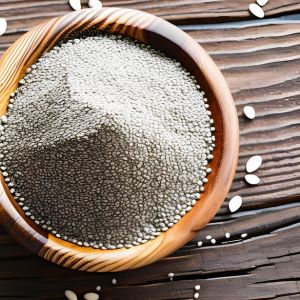
Chia seeds are a great substitute for walnuts. They have a mild, nutty flavor with a slightly sweet taste. The texture of chia seeds is crunchy and slightly gelatinous, which makes them a great addition to recipes like smoothies, puddings, or as an egg substitute in baking.
Chia seeds are also a great source of fiber, protein, and healthy fats, making them a nutritious alternative to walnuts. They are also rich in vitamins and minerals like calcium, magnesium, and zinc.
10. Sesame Seeds:
Sesame seeds are a great substitute for walnuts. They have a mild, nutty flavor with a slightly sweet taste. The texture of sesame seeds is crunchy and slightly chewy, which makes them a great addition to recipes like homemade granola, hummus, or as a topping for stir-fries.
Sesame seeds are also a great source of protein, fiber, and healthy fats, making them a nutritious alternative to walnuts. They are also rich in vitamins and minerals like calcium, iron, and magnesium.
11. Poppy Seeds:
Poppy seeds are a great substitute for walnuts. They have a mild, nutty flavor with a slightly sweet and earthy taste. The texture of poppy seeds is crunchy and slightly chewy, which makes them a great addition to recipes like muffins, cakes, or as a topping for yogurt.
Poppy seeds are also a great source of fiber, protein, and healthy fats, making them a nutritious alternative to walnuts. They are also rich in vitamins and minerals like calcium, iron, and magnesium. However, it is important to note that poppy seeds can have a mild sedative effect, so they should be used in moderation.
I. Legume Substitutes for Walnuts
12. Chickpeas:
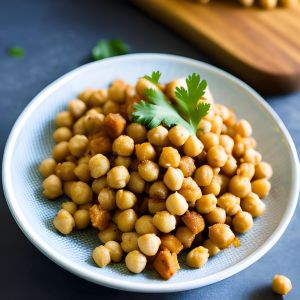
When you think of chickpeas, you probably imagine hummus or falafel, but did you know they can also be a great walnut substitute? Chickpeas have a nutty flavor that can add depth and complexity to your dishes. They have a soft, creamy texture that’s similar to a boiled walnut, making them an ideal replacement in baked goods or salads.
13. Lentils:
Lentils are a versatile legume that can work as a fantastic walnut substitute. They have a subtle nutty flavor and a firm texture that holds up well in savory dishes. Lentils are also a great source of protein and fiber, making them an excellent option for vegetarians and vegans looking for a meat-free alternative.
14. Peanuts:
Peanuts are one of the most popular legumes out there and for a good reason. They’re crunchy, creamy, and have a rich, nutty flavor that’s hard to resist. They’re also readily available and much cheaper than walnuts, making them an excellent option for anyone on a budget.
15. Soy Nuts:
Soy nuts may not be as well-known as other legumes, but they’re definitely worth trying as a walnut substitute. They have a crunchy texture and a mild, nutty flavor that works well in trail mixes, salads, or as a topping for oatmeal or yogurt. Soy nuts are also high in protein, making them a great snack for post-workout recovery.
16. Fava Beans:
Fava beans are a hearty legume that can work as a fantastic walnut substitute. They have a slightly sweet, nutty flavor and a firm, creamy texture that’s perfect for soups or stews. Fava beans are also rich in fiber and iron, making them an excellent addition to any vegetarian or vegan diet.
III. Other Substitutes for Walnuts
17. Pine Nuts:
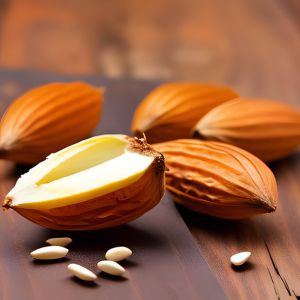
Pine nuts are another nut that can be used in place of walnuts. They have a buttery, rich flavor with a slight sweetness that is perfect for both sweet and savory dishes. Pine nuts are a bit smaller and softer in texture than walnuts, but they still add a nice crunch to any dish. They are commonly used in Italian cuisine, like in pesto sauce, and also in Middle Eastern and Mediterranean cooking.
18. Chestnuts:
Chestnuts have a sweet, nutty flavor and a soft, starchy texture that makes them a great substitute for walnuts in many recipes. They are often used in desserts, like chestnut cream or chestnut cake, but they can also be used in savory dishes like soups and stews. Chestnuts are a great source of fiber and vitamin C, making them a nutritious alternative to walnuts.
19. Brazil Nuts:
Brazil nuts have a rich, creamy flavor with a slight bitterness that pairs well with sweet dishes. They are similar in texture to walnuts but have a slightly softer, smoother texture. Brazil nuts are also a good source of selenium, a mineral that is important for thyroid health and immune function. They are often used in desserts, like chocolate truffles or nut butter, but can also be chopped up and used in salads or as a topping for oatmeal.
20. Pistachios:
Pistachios have a distinct, slightly sweet flavor with a slightly salty taste. They are smaller in size than walnuts, but have a similar crunchy texture. Pistachios are often used in Middle Eastern cuisine, like in baklava or as a topping for hummus. They are also a good source of protein, fiber, and healthy fats, making them a nutritious alternative to walnuts.
21. Flax Seeds:
Flax seeds are a great alternative to walnuts for people who are allergic to nuts or who are looking for a vegan option. They have a slightly nutty flavor and a crunchy texture that is similar to walnuts. Flax seeds are also high in fiber and omega-3 fatty acids, making them a great addition to any diet. They can be ground up and used as a replacement for flour in baked goods, or sprinkled on top of salads or oatmeal.
22. Quinoa:
Quinoa is another great alternative to walnuts for people who are looking for a vegan or gluten-free option. It has a slightly nutty flavor and a crunchy texture that is similar to walnuts. Quinoa is also a great source of protein and fiber, making it a nutritious addition to any meal. It can be used in salads, as a replacement for rice or pasta, or even in desserts like quinoa pudding.
23. Oats
Oats are a versatile ingredient that can be used in both sweet and savory dishes. They have a mild, nutty flavor and a chewy texture. As a walnut substitute, oats work particularly well in baked goods like cookies and granola. Simply substitute an equal amount of oats for walnuts in your recipe, or mix oats with other nuts and seeds for a DIY trail mix.
24. Wheat Germ
Wheat germ is the nutrient-rich inner part of the wheat kernel. It has a nutty, slightly sweet flavor and a crunchy texture. It’s a good source of protein, fiber, and essential vitamins and minerals. As a walnut substitute, wheat germ can add crunch and nutrition to baked goods, smoothies, and breakfast bowls. Simply use it in place of walnuts or sprinkle it over yogurt, oatmeal, or pancakes.
25. Coconut Flakes
Coconut flakes are made from dried and shredded coconut meat. They have a sweet, nutty flavor and a chewy texture. As a walnut substitute, coconut flakes work particularly well in desserts like cakes, muffins, and energy balls. Simply substitute an equal amount of coconut flakes for walnuts in your recipe, or mix them with other nuts and seeds for a flavorful trail mix.
26. Cacao Nibs
Cacao nibs are small pieces of roasted cacao beans. They have a bitter, chocolatey flavor and a crunchy texture. As a walnut substitute, cacao nibs add a rich, chocolatey flavor to baked goods like brownies, cookies, and cakes. Simply use them in place of walnuts or mix them with other nuts and seeds for a delicious and nutritious trail mix.
27. Carob Chips
Carob chips are made from carob powder, which comes from the pod of the carob tree. They have a sweet, chocolatey flavor and a smooth, creamy texture. As a walnut substitute, carob chips work particularly well in desserts like cookies, cakes, and fudge. Simply use them in place of walnuts or mix them with other nuts and seeds for a tasty and unique trail mix.
28. Rice Cakes
Rice cakes are a great option for those who are allergic to walnuts or looking for a healthier alternative. They have a neutral flavor profile that can easily take on other flavors, and a crunchy texture that can mimic the crunch of walnuts. Rice cakes can be easily crumbled and added to recipes as a substitute for walnuts. They are a great option for those who are looking for a low-fat, low-calorie alternative to walnuts.
Rice cakes can be used in a variety of recipes as a substitute for walnuts. They can be crumbled and added to oatmeal or yogurt for a crunchy texture, or used as a crust for pies and other desserts. They can also be used as a substitute for walnuts in baked goods such as muffins and cakes.
29. Bread Crumbs
Bread crumbs are a great alternative to walnuts for those who are allergic to nuts or looking for a low-fat alternative. They have a mild flavor profile and a crunchy texture that can mimic the texture of walnuts. Bread crumbs can be easily added to recipes as a substitute for walnuts.
Bread crumbs can be used as a substitute for walnuts in a variety of recipes such as breads, muffins, and cakes. They can also be used as a topping for casseroles and pasta dishes.
30. Tofu
Tofu is a great alternative to walnuts for those who are allergic to nuts or looking for a low-fat alternative. It has a neutral flavor profile and a soft, slightly chewy texture that can mimic the texture of walnuts. Tofu can be easily crumbled and added to recipes as a substitute for walnuts.
Tofu can be used as a substitute for walnuts in a variety of recipes such as stir-fries and salads. It can also be used as a substitute for walnuts in baked goods such as muffins and cakes.
Frequently Asked Questions
Walnut substitute for banana bread
There are several good substitutes for walnuts in banana bread. One option is to use pecans, which have a similar texture and nutty flavor. Another option is to use chopped almonds or hazelnuts for a slightly different taste and crunch. Other nut options include pistachios, cashews, or macadamia nuts, which can add a unique flavor to the banana bread. For a nut-free option, sunflower seeds or pumpkin seeds can be used to provide a similar crunch. Chia seeds or flax seeds can also be added for a boost of nutrition and texture. Ultimately, the choice of substitute will depend on personal preference and dietary restrictions.
Walnut substitute in baking
When it comes to substituting walnuts in baking recipes, there are a variety of options to choose from. Some of the best substitutes for walnuts in baking include:
- Pecans: These nuts have a similar texture and taste to walnuts and can be used in many of the same ways. They are slightly sweeter and have a more buttery flavor than walnuts.
- Almonds: Another popular nut substitute for walnuts in baking, almonds have a mild, nutty flavor and a crunchy texture. They work well in cakes, cookies, and bread.
- Hazelnuts: With a similar texture to walnuts, hazelnuts are a great option for substituting in recipes that call for chopped walnuts. They have a slightly sweeter and richer flavor that can add depth to baked goods.
- Cashews: These nuts have a mild, creamy flavor that can add richness and texture to baked goods. They work well in recipes that call for ground or chopped nuts.
- Sunflower seeds: A great nut-free option for those with allergies, sunflower seeds can be used in place of walnuts in recipes such as muffins, granola bars, and bread.
What can I substitute for walnuts in carrot cake?
Here are some options to substitute walnuts in carrot cake:
- Pecans
- Almonds
- Hazelnuts
- Cashews
- Pumpkin seeds
- Sunflower seeds
- Hemp seeds
- Chia seeds
- Macadamia nuts
- Pine nuts
- Chestnuts
- Brazil nuts
- Pistachios
- Flax seeds
- Wheat germ
- Coconut flakes
- Cacao nibs
- Carob chips
- Oats
- Rice cakes
- Bread crumbs
- Tofu
What is a good substitute for walnuts in brownies?
Pecans, hazelnuts, almonds, and macadamia nuts are good substitutes for walnuts in brownies. Other options include sunflower seeds, pumpkin seeds, or chocolate chips.
Can I substitute almonds for walnuts in cake?
Yes, you can substitute almonds for walnuts in cake. Almonds have a similar texture and nutty flavor to walnuts, so they can be used in a similar way in baking. However, keep in mind that almonds have a slightly sweeter flavor than walnuts, which may affect the overall taste of the cake. It’s always a good idea to experiment with different substitutes and find the one that works best for you.
What are the cheap substitute for walnuts
If you’re looking for a cheaper substitute for walnuts, there are a few options to consider:
- Peanuts: Peanuts are much more affordable than walnuts and have a similar texture and taste. They can be used in baking or as a topping for salads and desserts.
- Sunflower seeds: Sunflower seeds are another affordable option that can be used as a substitute for walnuts. They have a nutty flavor and a crunchy texture that works well in baked goods and salads.
- Pumpkin seeds: Pumpkin seeds are also a budget-friendly alternative to walnuts. They have a mild nutty flavor and a slightly chewy texture that can add some crunch to recipes.
- Sesame seeds: Sesame seeds are another option that can be used as a substitute for walnuts. They have a toasty, nutty flavor and can be used in baking or as a topping for salads and stir-fries.
Are walnuts a good substitute for meat?
Walnuts are not a good substitute for meat as they do not provide the same nutritional value and protein content as meat. While walnuts can provide a meaty texture, they may not offer the same level of savory taste as meat. Additionally, walnuts have a softer crunch compared to meat, which can also affect the overall texture and mouthfeel of a dish.
While walnuts are a good source of healthy fats and other nutrients, they do not contain the same essential amino acids as meat that are necessary for building and repairing muscles. However, walnuts can be used as a meat substitute in certain dishes for their texture and flavor. For example, ground walnuts can be used in vegan meatballs or burgers to provide a similar texture and nutty flavor to meat.
Conclusion
We encourage our readers to experiment with these different walnut substitutes and share their experiences with us. While these walnut substitute foods may not be a perfect match for walnuts, they can still provide similar flavors and textures in recipes, making them a great option for those with dietary restrictions or limited access to walnuts.
So, next time you are in the kitchen, don’t be afraid to try something new and substitute walnuts with one of these alternatives. You may discover a new favorite ingredient or recipe in the process!
